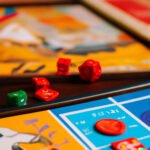Introduction
Puzzles and board games offer an engaging and entertaining way to spend time together as a family. From educational advantages to increased physical activity, there are numerous advantages that come with playing puzzles and board games.
Playing puzzles and board games can help strengthen the bond between the players, as well as foster communication, cooperation and collaboration among friends or family members. With puzzles, children learn discipline and concentration from completing the puzzle piece by piece, while board games encourage strategizing in building or accomplishing a desired outcome. Puzzles and board games also provide valuable entertainment – from keeping siblings entertained on road trips or bringing adults together for game night, everyone is sure to benefit from the amusement of solving puzzles or competing in a rousing game of Monopoly ” without screens or plug-ins. Plus, because most puzzles and board games require physical movement even if it’s just placing pieces on the table ” they offer increased physical activity over traditional video game options. Finally, playing with puzzles and board games requires creativity and imagination; two skills essential for success in schoolwork, specifically reading proficiency which helps build comprehension skills when discussing the game play.
Different Categories & Sub-Genres of Puzzles & Board Games
Puzzles and board games are classified into many different categories and sub-genres, depending on the type of game being played. Puzzle games typically involve logic-based challenges such as crosswords, word searches, sodoku, jigsaw puzzles etc., while some popular board games incorporate rolling dice, card play and strategy elements such as Chess, Clue, Monopoly, Risk and Stratego. Other categories include strategy/war games like Axis & Allies, real-time/action games like Settlers of Catan, trivia/party games like Trivial Pursuit or Apples to Apples and educational board games for learning about topics like Maths or Science. Some newer types of board games also exist that focus heavily on character building or collaborative play. These are becoming very popular in recent years with titles like Pandemic Legacy or Shadows Over Camelot challenging players to work together in order to achieve a common goal while progressing through numerous game rounds and cultivating their own storyline within the game world.
Strategies & Tips for Successful Playing of Puzzles & Board Games
Puzzles and board games have been around for centuries, offering a great way to spend time with friends and family while also providing a challenging and entertaining experience. Here are some strategies and tips that can help ensure that your puzzle and board game playing goes smoothly.
1. Come prepared ” Have all of the necessary pieces or components laid out before beginning, as well as read through the instructions before starting. Understanding how to play the game is essential for success.
2. Take breaks ” Taking regular breaks during long game sessions will help keep everyone in good spirits and sustain focus for the duration of playtime.
3. Listen carefully ” Paying attention to instructions from other players, rules of the game, as well as advice from experienced players can be invaluable when it comes to succeeding in puzzles or board games.
4. Maintain diplomacy ” Playing fairly without taking advantage of opponents is important when it comes to having fun with others, so it’s important not to get too competitive during play time!
5. Implement creative strategies ” Thinking outside-the-box can be beneficial when faced with difficult puzzles or issues in board games. Brainstorming solutions can often lead to success, so take advantage of this type of creative thinking!
6. Be organized ” Keeping track of cards dealt, pieces used, and other components between turns can make it easier for everyone involved during game time by reducing confusion or frustration.
7. Anticipate obstacles – Being ready for unexpected problems such as an opponent doing something out of turn or making a move you weren’t expecting can be useful in order to quickly rectify any gameplay issues without detracting from the enjoyment overall .
How Puzzles & Board Games Help Develop Cognitive Skills
Puzzles and board games help to develop cognitive skills in a variety of ways. Puzzles, particularly those requiring logical thought, assist in developing problem-solving and reasoning capabilities. This type of exercise helps to form connections, both tangible and mental, between the pieces and to focus on the detail while looking at the bigger picture. Board games require the player to think strategically in order to win or compete. During this process of strategizing, players must analyze their position as it changes by considering the steps their opponents have taken and what steps they must take next based on those decisions. Planning ahead is a valuable skill that board games promote for success. Additionally, these activities provide an opportunity for socialization, communication and development of interpersonal skills – all valuable components of human interaction that often cannot be found elsewhere outside school or work environments.
Where to Find the Best Puzzles & Board Games
Finding the best puzzles and board games can be exciting but daunting due to their sheer variety. The most popular places to buy puzzles and board games are department stores, big-box retailers, game stores, and online vendors. Department stores typically have a wide selection of puzzles suitable for children with cartoon characters and beloved franchises like Disney featured prominently on the packaging. Big box retailers usually carry some more complex options as well as classic favorites such as Monopoly or Clue. Game stores specialize in tabletop gaming products and often contain independent sections of game pieces, cards, dice, books, and simulated environments that recreate historic events or stories. Online vendors offer an even larger selection than most physical stores with hundreds of different brands available. Whether you’re looking for cheap classics or high-end strategy games, nearly any type of puzzle or board game can be found with a quick internet search.
Creative & Innovative Ideas for Customizing Puzzles & Board Games
1. Add Personalization: Whether it be monogrammed letters, photos of your family or a special message, you can personalize your favorite game to instantly add a special touch. Puzzle pieces can be customized with individual names on each piece and game boards with customized artwork.
2. Create Custom Play Pieces: Replace the included pieces with ones you’ve made yourself using clay or wood carving techniques. You can also get creative by using items like rocks, shells or even coins instead to play some classic board games
3. Make Your Own Label: If you don’t want to customize the actual pieces, make your own label for the box featuring original art or photos of your family members playing the game together.
4. Add New Rules: For some extra fun and a completely new experience, try adding in some extra rules or changing up existing ones. This is especially useful if you are bored with an old game and want to inject some fresh energy into it so that everyone can enjoy it even more!
5. Include Time Restrictions: To increase challenge levels (or just force quick decisions!), include time restrictions ” for example, players can only have five seconds for each turn! It’s sure to put some pressure on everyone’s strategic thinking skills!
Conclusion
Puzzles and board games are an excellent way to keep your mind active, learn new skills, relieve stress, and even build relationships with those around you. Puzzles require careful thought and focus to make educated guesses about how the different pieces fit together. Board games involve strategy, chance, and working together or against others as you try to achieve your goal. In either case, puzzling and gaming can provide hours of enjoyable entertainment for all ages.
Along with providing hours of enjoyment, puzzles and board games have been proven to help stimulating the mind and improving cognitive function. Studies have shown that people who regularly complete puzzles improve in areas such as problem-solving skills, critical thinking skills, deductive reasoning abilities, and processing speed. Playing board games impact cognitive skills such as memory recall and multi-tasking abilities which can help boost intellectual performance both in the present moment and over time.
Puzzles and board games also promote social engagement and emotional intelligence. Games involving multiple players allow people to interact in ways that foster camaraderie while developing interpersonal communication skills on topics ranging from mundane conversations to deeper collaboration on solutions within a game context. Puzzles are solo activities in essence but may have spirited discussions among groups when players compare their strategies or pool resources together to solve greater challenges more efficiently or faster than traditional individual attempts at resolution would permit.
In conclusion, puzzles & board games offer a wide range of benefits: from improved cognitive functioning & emotional intelligence;to helping foster connections between friends & family members;and ultimately leading to an overall sense of satisfaction when completing the task that was presented before you or achieving victory against your opponents! So why not give one of these categories a shot today? You won’t regret it!

I love playing all kinds of games – from classics like Monopoly to modern favourites like Ticket to Ride.
I created this blog as a way to share my love of board games with others, and provide information on the latest releases and news in the industry.





